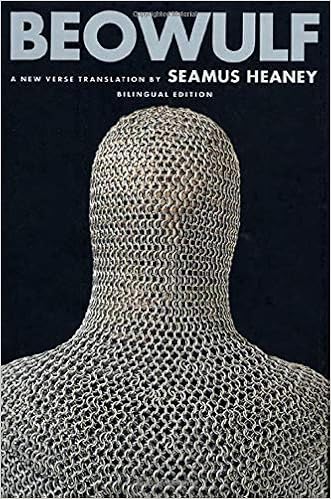|
Seamus Heaney, Beowulf: A New Translation (Farrar Straus & Giroux, 2000)
There are many translations of this epic available (including the popular Penguin Classics edition as well as several online versions, such as this translated by Francis B. Gummere at the Alderman Library, University of Virginia, and another by Dr. David Breeden at the Culture Cafe. Obviously, each translator brings unique poetical talent and skills to the task, but it is reasonable to question why we need another one. In answer, it is fair to say that any text that comes under the scrutiny of poet, scholar and Nobel laureate Seamus Heaney is bound to emerge renewed and enlivened, a contention borne out by his receipt of the prestigious Whitbread literary prize in Britain for Beowulf: A New Translation. Further, as pointed out by the translator in the introduction to this work, sections of the poem (3182 lines of verse in total) can leave the unprepared reader bewildered. One straightforward aid employed here is to italicise those parts of the narrative which form a poem-within-a-poem. This makes for clarity, as does the placing of short prose summations at intervals in the text margin. The events of the poem occur in Scandinavia, and at its beginning the hero/warrior Beowulf sets sail for the land of the Danes, there to do battle with the man-eating monster Grendel. Later, amid political and personal inconstancy and growth, a dragon too must be slain. This is, of course, an ancient work, written at a time when such creatures as monsters and dragons held sway in the human imagination. Nevertheless it would be wrong to consider it merely a worthy, but esoteric curiosity. Monsters can be real enough even to the modern mind, a point Heaney makes in the introduction: "Grendel comes alive in the readers imagination as a kind of dog-breath in the dark, a fear of collision with some hard-boned and immensely strong android frame...." The word "android" made me aware of the life and dwelling that the direct descendants of these ancient monsters still have in the modern imagination -- shifted now to science fiction -- and brought a freshness to lines like the following: "A wildness rose As always it is the words of the poem itself and the emotions they evoke which serves as the criteria by which any work of poetry has to be judged. Here, for example, is how Heaney renders in translation from the original Anglo-Saxon the mental state of Grendel's mother ("that swamp-thing from hell") after Beowulf has slain her offspring: "Grendel's mother, Only a mother can truly "brood" on her wrongs, and even on a first reading of Heaney's Beowulf. A New Translation, such words detonate in the mind like firecrackers. Often it is the sound of a word alone, as when a sword is "slathered" in blood. Such language is a joy in itself. Heaney also helps us appreciate the ancient roots of Beowulf , since onomatopoeia is much closer to the oral tradition from which the original written work derives. Here Beowulf speaks of his wounding of the monster Grendel: He has done his worst but the wound will end him. Resisting the temptation to quote further I instead urge you to experience this book yourself, a fascinating one which is guaranteed to become more so upon each opening. 

|
 Rambles.NET book review by Conor O'Connor 26 April 2000 Agree? Disagree? Send us your opinions!  



 |

